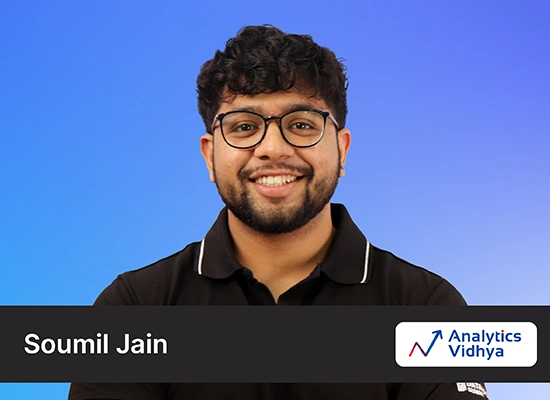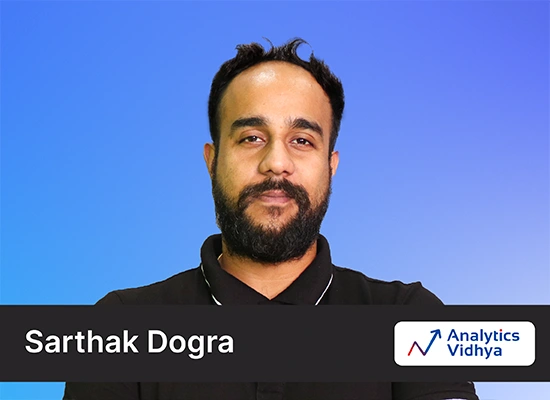Introduction
Imagine being on the brink of a technological revolution where language transforms how we interact with machines. Enter the world of Large Language Models (LLMs)—the backbone of innovations like intelligent chatbots and advanced data analysis. The best part? You don’t need to spend a fortune to dive in. A wealth of free resources awaits, ready to guide you through the fascinating landscape of LLMs. Whether you’re a curious beginner or looking to enhance your skills, these ten free resources will empower you to unlock the potential of AI and elevate your understanding of this groundbreaking technology. Get ready to embark on your journey!
Learning Outcomes
- Discover 10 free resources to learn about LLMs.
- Understand the strengths of each resource.
- Identify which resources best match your learning style.
- Gain access to materials that cover the fundamentals of LLMs.
- Explore advanced topics in LLMs through free courses and materials.
Table of contents
- Introduction
- Free Resources to Learn LLMs
- Getting Started with LLMs by Analytics Vidhya
- LLM University by Cohere
- Intro to Large Language Models by Andrej Karpathy
- A Practical Introduction to Large Language Models (LLMs) by Shaw Talebi
- List of Research Papers on Large Language Models (LLMs)
- Analytics Vidhya Blogs
- LLMOps by DeepLearning.AI
- Full Stack LLM Bootcamp
- Introduction to Large Language Models by Google Cloud
- Finetuning Large Language Models
- Conclusion
- Frequently Asked Questions
10 Free Resources to Learn LLMs
Let us now look into the free resources that can help you to learn LLMs.
1. Getting Started with LLMs by Analytics Vidhya
Embarking on a journey into Large Language Models (LLMs) can be seamless with the right approach. This course offers an optimal pathway to delve into the intricacies of LLMs and model training. It will help you gain a comprehensive understanding of LLMs and develop advanced applications using the PyTorch framework. With a carefully curated list of resources and exercises, this course serves as a guide to mastering the techniques required to build and fine-tune LLMs, generating human-like text.

- Key Topics Covered: Introduction to LLMs, PyTorch fundamentals, model fine-tuning, text generation.
- Unique Features: Curated resources, hands-on exercises, PyTorch-focused training, industry-relevant applications.
- Target Audience: Professionals and aspiring students looking to expand their skills and leverage LLMs across different industries.
2. LLM University by Cohere
Cohere’s LLM University offers a specialized approach to learning LLMs. The platform provides in-depth tutorials, webinars, and projects focused on implementing LLMs in various applications. This resource is particularly valuable for those looking to go beyond the basics and explore advanced techniques in LLM development.

- Key Topics Covered: Text Representation and Generation, Deployment, Semantic Search, Prompt Engineering, Retrieval-Augmented Generation,
- Unique Features: Comprehensive Learning Hub, Step-by-Step Guides, Practical Applications
- Target Audience: This course is ideal for developers and technical professionals looking to enhance their understanding of LLMs and Enterprise AI technologies.
3. Intro to Large Language Models by Andrej Karpathy
While I would recommend this lecture as a good starting point to be introduced to the core technical concepts behind Large Language Models (LLMs), this 1-hour video lecture by Andrej Karpathy. In his simplistic and informal blog addressed to the general public, Karpathy reveals what LLMs are, how they operate, and what they might become as well as he compares LLMs to the current operating systems. The lecture also discusses some of the relatively recent security concerns associated with LLMs, which makes it a comprehensive overview of this constantly developing subject area.

- Key Topics Covered: Overview of LLMs, future developments, comparisons to operating systems, security challenges.
- Unique Features: Based on a popular talk given at the AI Security Summit, recorded with insightful analogies, and personal reflections from Karpathy.
- Target Audience: General audience, LLM enthusiasts, and professionals curious about the broader implications of LLM technology.
4. A Practical Introduction to Large Language Models (LLMs) by Shaw Talebi
This comprehensive YouTube playlist by Shaw Talebi offers a detailed, hands-on guide to working with Large Language Models (LLMs). Spanning topics from using OpenAI’s Python API and Hugging Face Transformers to fine-tuning LLMs and building custom AI assistants, this series is an excellent resource for both beginners and experienced developers. With practical examples, including code snippets, the playlist dives deep into the implementation and engineering side of LLMs.

- Key Topics Covered: OpenAI API, Hugging Face Transformers, prompt engineering, fine-tuning, building custom AI assistants, QLoRA, RAG, and semantic search.
- Unique Features: Each video is packed with practical examples, Python code, and detailed instructions for working with LLMs, including how to run models on single GPUs and fine-tune them locally on different devices.
- Target Audience: AI developers, machine learning practitioners, and entrepreneurs looking to apply LLMs in real-world applications.
5. List of Research Papers on Large Language Models (LLMs)
This free resource that provides a collection of highly influential research papers to guide you through the development and advancements of Large Language Models (LLMs). Covering topics from foundational work to techniques like fine-tuning and instruction tuning, this list is essential for those looking to dive deep into the technical and theoretical aspects of LLMs.
- Key Topics Covered: Transfer learning, few-shot learning, instruction tuning, model scaling, transformer efficiency, and LLM compression techniques.
- Unique Features: The collection is comprehensive, including papers on both foundational breakthroughs (like the original transformer models) and cutting-edge methods for training, optimizing, and serving LLMs efficiently. It’s an excellent starting point for researchers or practitioners aiming to understand the technical backbone of LLMs.
- Target Audience: AI researchers, machine learning engineers, and anyone interested in the inner workings of LLMs and their evolution.
Below is the list:
- WARM: On the Benefits of Weight-Averaged Reward Models
- Tuning Language Models by Proxy
- Evaluating Large Language Models Trained on Code
- Training language models to follow instructions with human feedback
- Finetuned Language Models Are Zero-Shot Learners
- Multitask Prompted Training Enables Zero-Shot Task Generalization
- Outrageously Large Neural Networks: The Sparsely-Gated Mixture-of-Experts Layer
- GShard: Scaling Giant Models with Conditional Computation and Automatic Sharding
- Efficient Memory Management for Large Language Model Serving with PagedAttention
- ZeRO: Memory Optimizations Toward Training Trillion Parameter Models
- QLoRA: Efficient Finetuning of Quantized LLMs
- BitNet: Scaling 1-bit Transformers for Large Language Models
6. Analytics Vidhya Blogs
The blog section of Analytics Vidhya hosts consolidated articles on LLM and is filled with resourceful information for data science Freaks. This resource comprises of articles, case studies, and tutorials that are produced to assist in the understanding of the various issues relevant to LLMs. This is a very beneficial source for readers who are inclined towards reading and also for those who need to find out the trends going on in the field.
You can also enroll in our free course today to learn more about LLMs.

- Key Topics Covered: LLM case studies, tutorials, industry applications.
- Unique Features: Detailed articles, real-world case studies, community discussions.
- Target Audience: Intermediate to advanced learners.
Below is the list on LLM articles:
- What are Large Language Models (LLMs)?
- How to Build Large Language Models from Scratch ?
- A Survey of Large Language Models (LLMs)
- 7 Essential Steps to Master Large Language Models
- 10 Exciting Projects on Large Language Models(LLM)
7. LLMOps by DeepLearning.AI
In this you’ll learn to adapt an open-source pipeline that applies supervised fine-tuning on a Large Language Model (LLM) to enhance its ability to answer user questions effectively. You will explore best practices, including versioning data and models, as well as preprocessing large datasets inside a data warehouse.

- Key Topics Covered: LLMOps Pipeline Fundamentals, Supervised Tuning Pipeline, Hands-On LLM Interaction, Tools and Technologies.
- Unique Features: Focus on operational aspects, hands-on tutorials, Integration with Industry Tools.
- Target Audience: This course is ideal for anyone looking to learn how to tune a Large Language Model and build an LLMOps pipeline, from beginners to those looking to enhance their existing skills.
8. Full Stack LLM Bootcamp
The Full Stack LLM Bootcamp is a 48-hour immersion program aimed at arming participants with best-practice principles and a range of solutions in relation to LLM powered applications. This course comprehensively takes the learners through the development stack beginning with the prompt engineering and user experience design, in order to equip them with the best practice and contemporary approaches to the fast growing field of Large Language Models (LLMs).
It was conducted as an in-person bootcamp in San Francisco in April 2023 If you missed out on it, then worry not Since then, the raw lectures were recorded and made freely available Online privacy has turned into an international human rights issue.

- Key Topics Covered: Prompt Engineering, LLMOps, Augmented Language Models, LLM Foundations
- Unique Features: This bootcamp emphasizes hands-on learning and practical application, providing participants with the confidence to transition into building LLM applications effectively.
- Target Audience: Developers, data scientists, and tech enthusiasts interested in leveraging LLM technology to create innovative applications.
9. Introduction to Large Language Models by Google Cloud
Google Cloud offers a comprehensive introduction to LLMs through its online courses. This resource is perfect for those who are looking to understand LLMs from a cloud computing perspective. The course covers the basics of LLMs, as well as how to implement them using Google Cloud’s infrastructure.

- Key Topics Covered: LLM basics, cloud-based implementation, Google Cloud tools.
- Unique Features: Cloud-focused content, hands-on labs, integration with Google Cloud.
- Target Audience: Beginners to intermediate learners interested in cloud computing.
10. Finetuning Large Language Models
The “Finetuning Large Language Models” course covers the core principles of fine-tuning LLMs and distinguishes it from prompt engineering. You’ll gain practical experience with real datasets, learning how to apply fine-tuning techniques to improve model performance. The course also explores when to use fine-tuning versus prompt engineering in various scenarios. This hands-on approach equips you with valuable skills for your own AI projects.

- Key Topics Covered: Fine-tuning fundamentals, differences from prompt engineering, practical applications with real data, and optimization strategies.
- Unique Features: Hands-on practice with datasets, clear distinction between fine-tuning and prompt engineering, practical techniques for model customization, and real-world application emphasis.
- Target Audience: AI enthusiasts, data scientists, machine learning engineers, and developers aiming to enhance LLMs and apply fine-tuning methods to their projects.
Conclusion
There are no cost implications linked to acquiring knowledge on LLMs which can effectively be gotten from the internet as well as related docket books. With these ten free resources, it is now possible for you to get an introduction to the large language models for free. Regardless of whether you prefer text-based materials strictly organized in courses and structured, practical assignments and projects, or comprehensive articles, LingQ has it all. Here you go, go ahead and begin discovering the rather interesting area of LLMs right now!
Frequently Asked Questions
A. LLM stands for Large Language Model, a type of AI model designed to understand and generate human language.
A. Yes, some resources like DeepLearning.AI and Google AI’s courses are beginner-friendly.
A. GitHub Repositories and Hugging Face’s Tutorials are excellent for hands-on experience with real-world applications.
A. Absolutely. Many of these resources cater to professionals seeking to deepen their knowledge of LLMs.
A. Basic knowledge of AI and machine learning is helpful, but not always necessary as some resources cater to beginners.





